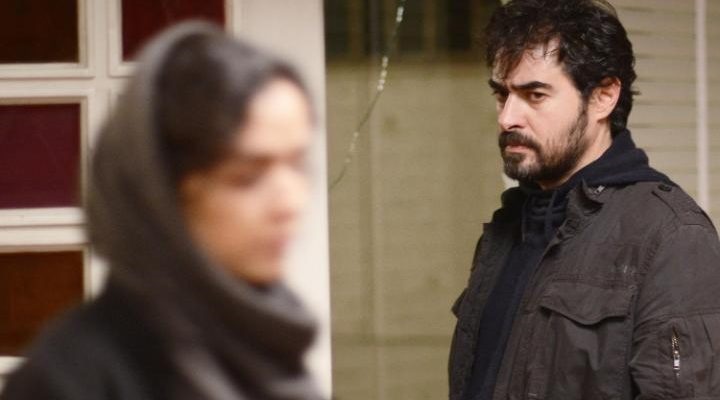
 Shahab
Hosseini (A Separation, About Elly) stars Tehrani resident
Emad, as a high school literature teacher by day, and involved in the
production of a Farsi community theater rendition of Arthur Miller's
masterwork, "Death of a Salesman," which he is also starring in as
Willy Loman, opposite his actress wife Rana as Linda (Taraneh
Alidoosti, Fireworks Wednesday). After being forced to leave
their current residence, they hastily move into an apartment building
recommended by one of their fellow actors, only to discover that the
prior tenant still had not entirely removed her belongings. While
there alone Rana ends up the victim of a brutally violent assault
while in the shower, leaving her traumatized from the event. Leary
about involving the police in a matter that could bring shame to the
couple, Emad seeks justice and perhaps revenge on the perpetrator, who
he believes may have entered the apartment mistakenly believing the
prior occupant, a reputed prostitute, had still been residing.
Shahab
Hosseini (A Separation, About Elly) stars Tehrani resident
Emad, as a high school literature teacher by day, and involved in the
production of a Farsi community theater rendition of Arthur Miller's
masterwork, "Death of a Salesman," which he is also starring in as
Willy Loman, opposite his actress wife Rana as Linda (Taraneh
Alidoosti, Fireworks Wednesday). After being forced to leave
their current residence, they hastily move into an apartment building
recommended by one of their fellow actors, only to discover that the
prior tenant still had not entirely removed her belongings. While
there alone Rana ends up the victim of a brutally violent assault
while in the shower, leaving her traumatized from the event. Leary
about involving the police in a matter that could bring shame to the
couple, Emad seeks justice and perhaps revenge on the perpetrator, who
he believes may have entered the apartment mistakenly believing the
prior occupant, a reputed prostitute, had still been residing.
Asghar Farhadi (The Past, Beautiful City) writes and directs
this Iranian drama, winner for Best Screenplay and Best Actor at
Cannes 2016, as well as the Best Foreign Language Film at the Oscars (Farhadi's
second film to win, after A Separation - becoming the fourth director
to win the award more than once, after Ingmar Bergman, Federico
Fellini, and Vittorio De Sica), where Farhadi was famously not in
attendance due to travel restrictions the Trump administration
attempted to place on several Middle Eastern countries, including
Farhadi's homeland of Iran. Farhadi had the idea for the film that had
yet to be fleshed out and came up with the notion of the main
characters being actors, because they would have to imagine themselves
in the shoes of another, something that would create the feeling of
empathy, even if the role they are playing isn't exactly a wholly good
person. Farhadi researched various plays before settling in on
Miller's "Death of a Salesman", because he felt they shared thematic
parallels with the film he had been trying to make.
Farhadi is
the master of posing moral dilemmas for his characters to sort
through, and though some of the actions taken within the film may seem
bad from an outside perspective, he is able to provide enough grey
area that make such actions seem sympathetic. The shaky, deteriorating
buildings foreshadow how the home can feel like it is crumbling from
the inside when a traumatic event takes over, as his films like to
explore how different sides of his characters emerge when faced with
traumatizing circumstances that won't allow them to proceed as normal.
As far as the main story's relation to 'Death of a Salesman",
the only strong connection is that it's about how a prideful man must
deal with the trials and tribulations of living in the modern world,
especially when humiliating consequences occur when judged by others.
Farhadi, though, is more interested in his own characters within the
play within the play, and how the external pressures begin to shape
not only their performances in unexpected ways, but also, in one
passionate scene, a bit of the dialogue. He allows the audience to
come to their own judgments on the drama that transpires, letting the
events unfold without overt need to evangelize or demonize anyone's
particular point of view. It's all impeccable, though I do have
one quibble from a storytelling standpoint, which is the way in which
Emad discovers the identity of the culprit, which only really stands
out because it is the major contrivance in a film that is otherwise
played out very naturally in its narrative.
Farhai's an
excellent filmmaker, and turns in a good and thoughtful film with
skillful performances, though The Salesman likely won't go
down as his best film for many, despite its accolades. Nevertheless,
it's a suspenseful drama with some interesting, realistic dilemmas.
Despite any cultural differences or language barriers, Farhadi is able
to root into universal themes where his dramas could happen just about
anywhere in the world, with sympathetic and complex characters that
aren't completely morally good or evil, but they are all very human,
putting us, as the audience, into the mindset of the characters having
to navigate through some tricky maneuvers in order to see the conflict
through to resolution.
Interestingly, Emad, who, as an actor by trade, has a blind spot
caused by his rage that doesn't allow himself to see things from the
perspective of another man, resulting one bad situation getting
supplanted by another, perhaps more egregious one. Interesting is the
irony whereby they must dress up in the clothes and make-up of an
elderly couple, one that will echo resoundingly when they must find a
way to place themselves in the position of having to relate to others
in a similar situation, but their own personal feelings are stifling
their ability to provide the empathy necessary to avoid conflict.
Farhadi sets all of these dilemmas up and then stands back from them,
letting the natural story take its course for our own perusal and
discussion, as we too must put ourselves in the shoes of this
well-drawn couple and ask ourselves, "What would we do in this
situation?"
Qwipster's rating:







©2017 Vince Leo

 Shahab
Hosseini (A Separation, About Elly) stars Tehrani resident
Emad, as a high school literature teacher by day, and involved in the
production of a Farsi community theater rendition of Arthur Miller's
masterwork, "Death of a Salesman," which he is also starring in as
Willy Loman, opposite his actress wife Rana as Linda (Taraneh
Alidoosti, Fireworks Wednesday). After being forced to leave
their current residence, they hastily move into an apartment building
recommended by one of their fellow actors, only to discover that the
prior tenant still had not entirely removed her belongings. While
there alone Rana ends up the victim of a brutally violent assault
while in the shower, leaving her traumatized from the event. Leary
about involving the police in a matter that could bring shame to the
couple, Emad seeks justice and perhaps revenge on the perpetrator, who
he believes may have entered the apartment mistakenly believing the
prior occupant, a reputed prostitute, had still been residing.
Shahab
Hosseini (A Separation, About Elly) stars Tehrani resident
Emad, as a high school literature teacher by day, and involved in the
production of a Farsi community theater rendition of Arthur Miller's
masterwork, "Death of a Salesman," which he is also starring in as
Willy Loman, opposite his actress wife Rana as Linda (Taraneh
Alidoosti, Fireworks Wednesday). After being forced to leave
their current residence, they hastily move into an apartment building
recommended by one of their fellow actors, only to discover that the
prior tenant still had not entirely removed her belongings. While
there alone Rana ends up the victim of a brutally violent assault
while in the shower, leaving her traumatized from the event. Leary
about involving the police in a matter that could bring shame to the
couple, Emad seeks justice and perhaps revenge on the perpetrator, who
he believes may have entered the apartment mistakenly believing the
prior occupant, a reputed prostitute, had still been residing.